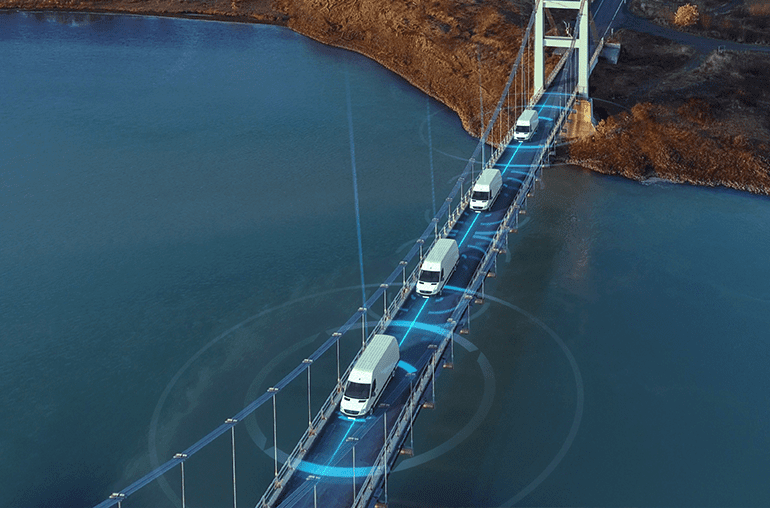
The Internet of Things (IoT) is at the heart of positive disruptions across all industries, and the transportation and logistics sector is no exception. This interconnected network of “things” includes devices, appliances, and other innovative technologies. Over time, it has emerged as a driving force behind major advancements, overcoming the many challenges companies in transport and logistics face today.
In this blog, we’ll cover the role of the Internet of Things in transportation and logistics, including various IoT challenges and how to overcome them. We’ll also discuss several ways you can leverage the network to meet the ever-evolving needs of your clientele.
The Role of IoT in Transportation
Transport and logistics companies worldwide have embraced IoT to boost operations by enhancing real-time data exchange between personnel, vehicles, and other assets. Great examples of applications of IoT in transportation include intelligent toll systems that manage traffic and mobile applications, allowing drivers to find and reserve parking in their preferred locations.
Considering the importance of IoT in transport and logistics, it’s not surprising that the revenue of the global IoT market is anticipated to hit $2,227 billion in 2028. This is more than twice its value in 2022, which sat at $970 billion. Undoubtedly, IoT is set to evolve rapidly over the next few years, with the advent of AI and machine learning integration providing more sustainable solutions in the transportation industry. With such a rapid progression, what transformations can this technology bring? Let’s find out.
How IoT is Revolutionizing the Industry
So how is IoT shaking up the industry? Here are just a handful of the benefits offered by IoT in transportation and logistics:
Real-Time Data Monitoring and Collection
IoT facilitates data monitoring and collection through the deployment of wired and battery-powered sensors, mobile apps and cameras. Wireless telematics devices and black boxes are also great examples of transportation technology used to gather information. Companies use the data collected from IoT devices to derive valuable insights and make smart decisions regarding business operations.
Predictive Maintenance
IoT devices enable predictive maintenance (PdM) in transportation and logistics by allowing companies to continuously monitor the condition and performance of vehicles and other machines and components. This technique typically uses data analysis to identify potential equipment defects and operational anomalies that could cause failure. Then, PdM systems alert maintenance teams so they can take proactive action in good time.
Ultimately, predictive maintenance helps extend the lifespan of transportation and logistics assets. This can reduce downtime and lower operational costs by 10%-40%.
Enhanced Customer Experience
IoT in transport operations improves customer experiences by providing real-time updates on the status of their trips. This lets companies and their customers know the location of cars, planes, and trains — as well as the expected arrival times — allowing for more accurate and reliable planning.
IoT can also facilitate quick and efficient ticketing and boarding, enable seamless connectivity between various modes of transportation, and open more options for passengers, all helping create better customer experiences.
Supply Chain Optimization
IoT aids supply chain optimization to help ensure optimal performance for transportation companies. IoT devices with GPS and other tracking technologies allow managers to monitor shipments or goods in transit, allowing greater visibility and control over operations.
In the long run, this increases efficiency and reduces operational expenses, boosting profitability. In fact, research shows that even a 5% reduction in supply chain costs may double net profits.
3 Powerful Ways to Use IoT in Transportation
Clearly, there are many advantages of IoT transport processes — but how can your organization take advantage of the technology? Let’s look at some examples of IoT in action.
1. Fleet Management
You can use IoT technologies to get real-time data and analytics to revolutionize fleet management. These solutions also offer automation capabilities that you can use for vehicle tracking, driver behavior monitoring, and fuel management. For route optimization, utilize IoT-enabled software. It leverages real-time traffic data, weather conditions, and vehicle telematics to identify the best paths to maximize fleet efficiency and enhance delivery performance.
2. Enterprise Mobility
Enterprise mobility management is also among the many IoT applications in transportation. This trend enables your employees to access company resources from any location, thanks to IoT in the cloud. As a result, you can integrate IoT devices into various aspects of transport operations and management, improving supply chain visibility, dispatch and routing, supply chain visibility, as well as safety and compliance. If you’re a manager, use IoT to streamline workflows, identify inefficiencies, and implement corrective measures, even with a remote workforce.
3. Equipment Management
You can use transportation IoT devices and software to monitor your equipment’s engine performance, fuel consumption, pressure, and other parameters. This enables you to monitor their condition and take the necessary measures to avoid breakdowns and expensive repairs. Additionally, leverage the data collected through IoT technology to gain insight into the best processes to optimize equipment performance. With access to vehicle speeds and driver behavior, you can ensure compliance with safety regulations to avoid accidents that could damage your transportation equipment.
Make the Transformation Today with MetTel
Without a doubt, IoT is reshaping the transportation industry. The integration of these technologies enhances efficiency, safety, and sustainability. At the forefront of this revolution is MetTel.
We offer comprehensive transportation and logistics services with everything you need to revolutionize your operations. From managed SD-WAN and network security services to managed network services and enterprise mobility solutions, we’re here to help you on the road to success.
With the right technology, making the most of IoT in the transportation industry has never been easier. Our IoT connectivity solutions are tailored to the unique demands of the transportation sector at large, as well as those of your company. Partner with MetTel and start driving operational efficiencies while creating a safer, more interconnected and sustainable future for transportation and logistics. Get started today!


